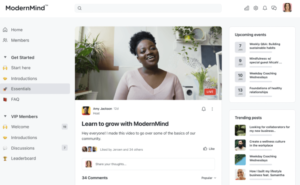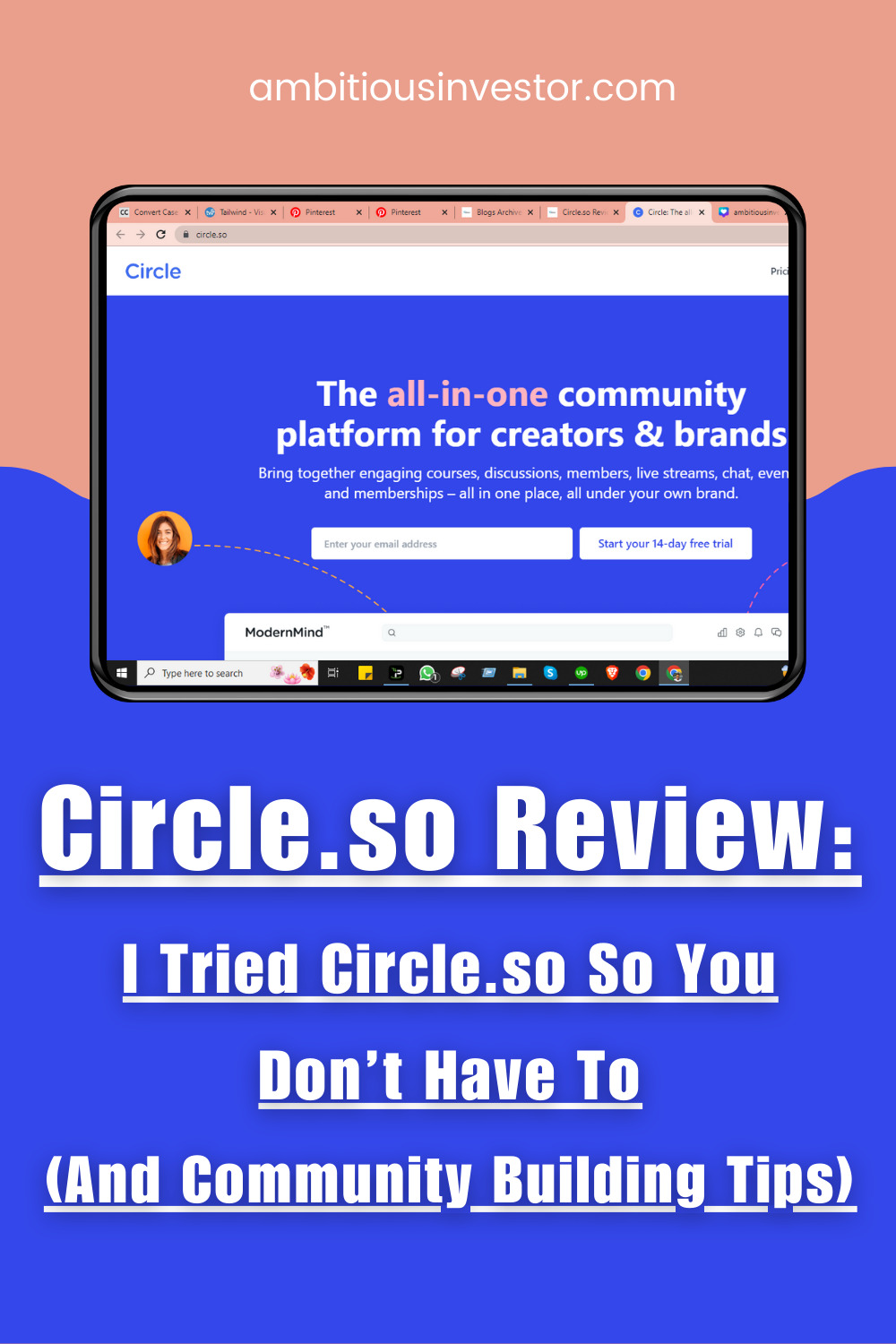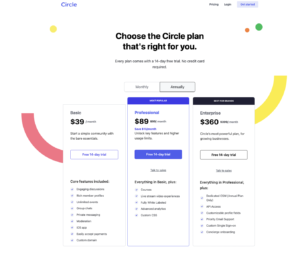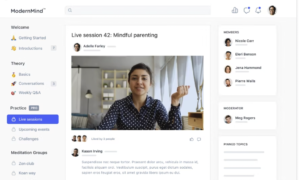If you are a creator, or plan to launch an online course there are a few options available online for an all in one platform for your customers.
Circle.so is a platform that enables creators and communities to build custom online spaces where they can connect, collaborate, create group coaching programs and grow together. Founded in 2019 by Andrew Guttormsen and Erik Torenberg, Circle.so has quickly become a popular choice for those looking to create online communities that offer more than just a simple discussion forum. This is a great side hustle option and one that can scale to a full time business.
In this blog, we’ll take a closer look at what Circle.so is, what it offers, and how it’s different from other community platforms. We’ll also explore some of the key features of the platform and examine some of the ways that creators and communities are using Circle.so to build stronger, more engaged audiences.
What is Circle.so?
At its core, Circle.so is a platform for building online communities. But what sets it apart from other community platforms is its focus on customization and flexibility. With Circle.so, creators and communities can build their own unique online spaces that reflect their brand, their values, and their goals.
One of the key features of Circle.so is its ability to integrate with a wide range of tools and services. This means that creators and communities can add features like custom domains, email marketing integrations, and analytics tracking to their online spaces. They can also use Circle.so‘s API to build custom integrations and automate tasks like member onboarding and content moderation.
Another important aspect of Circle.so is its focus on community moderation. Circle.so offers a range of moderation tools that enable creators and community managers to keep their online spaces safe, productive, and welcoming. These tools include the ability to block and ban members, moderate comments and posts, and set community guidelines that all members are expected to follow.
What sets Circle.so apart?
One of the key things that sets Circle.so apart from other community platforms is its focus on customization and flexibility. With Circle.so, creators and communities can build online spaces that are uniquely tailored to their needs and goals. This can help them to stand out from the crowd and build more engaged, loyal audiences.
Another important factor that sets Circle.so apart is its focus on community moderation. Circle.so offers a range of tools that enable creators and community managers to keep their online spaces safe and welcoming for all members. This can help to foster a sense of trust and community spirit that can be hard to find on other platforms.
Some of the other features that set Circle.so apart from other community platforms include:
- Advanced analytics and reporting: Circle.so offers a range of analytics tools that enable creators and community managers to track key metrics like member engagement, content performance, and more.
- Seamless integrations: Circle.so can integrate with a wide range of tools and services, making it easy to add new features and functionality to your online space.
- Custom branding: With Circle.so, creators and communities can customize the look and feel of their online spaces to match their brand and visual identity.
- Monetization options: Circle.so offers a range of monetization options, including the ability to charge for access to your online space, offer paid memberships, and sell digital products.
How are creators and communities using Circle.so?
Creators and communities are using Circle.so in a wide variety of ways, depending on their goals and needs. Here are just a few examples:
- Content creators: Many content creators are using Circle.so to build private online spaces where they can share exclusive content with their most loyal fans. This can include things like behind-the-scenes access, early previews of upcoming content, and personalized Q&A sessions.
- Business owners: Business owners are using Circle.so to build online communities around their brands. This can help them to engage with customers, build brand loyalty, and get valuable feedback and insights that can inform their business decisions.
- Niche communities: Some creators are using Circle.so to build communities around specific niche interests. This can include things like hobby groups.
What type of creators are using Circle.so
The platform is currently being used by a variety of creators such as bloggers, podcasters, YouTubers, online course creators, coaches, and business owners.
Bloggers and content creators use Circle.so to create a membership-based community where their readers or subscribers can connect with each other, share insights, and discuss topics related to the content they create.
Podcasters use Circle.so to build a community around their show, provide exclusive content to their listeners, and foster engagement and interaction among their audience.
Online course creators and coaches use Circle.so to provide a space where their students or clients can connect with each other, share experiences, and get support from their peers.
Business owners use Circle.so to build a community of customers or fans around their brand, product, or service, foster brand loyalty, and get feedback from their community.
Best Ways to Market Your Online Community for more Subscribers
There are several effective ways to market your online community and attract new members. Here are some strategies you can consider:
- Leverage social media: Use social media platforms such as Facebook, Twitter, LinkedIn, and Instagram to promote your community and share updates and announcements. Consider creating paid social media ads to reach a broader audience.
- Build an email list: Create a mailing list of potential members and send regular newsletters and updates about your community to keep them engaged and interested.
- Collaborate with other creators: Reach out to other creators in your niche and collaborate on projects or cross-promote each other’s communities to expand your reach.
- Optimize your website: Make sure your website is optimized for search engines with relevant keywords and meta descriptions, and consider using paid search ads to drive traffic to your community.
- Offer incentives: Offer incentives such as exclusive content, discounts, or free trials to entice people to join your community.
- Participate in online communities: Participate in other online communities related to your niche and share insights and resources. Be sure to include a link to your community in your profile or signature.
- Attend events: Attend relevant events such as conferences, webinars, or meetups to network with potential members and promote your community.
Overall, marketing your online community requires a mix of strategies that help you reach your target audience and entice them to join and engage with your community.
What are the Best tools for growing an online community
Growing an online community requires a mix of strategies and tools to attract new members, foster engagement, and create a sense of community. Here are some tools that can help you grow your online community:
Community Platforms
Platforms like Circle.so, Mighty Networks, and Discord provide a space where members can connect, share content, and interact with each other. These platforms offer a range of features such as discussion forums, chat rooms, polls, and events that can help you foster engagement and build a sense of community.
Social Media Management Tools
Tools like Hootsuite, Buffer, and Sprout Social can help you manage your social media presence and streamline your social media marketing efforts. These tools allow you to schedule posts, track metrics, and engage with your audience across multiple social media platforms.
Email Marketing Tools
Email marketing tools like Mailchimp, ConvertKit, and Constant Contact allow you to create and send newsletters, automated campaigns, and targeted email sequences to your community members. This can help you stay top-of-mind and provide valuable content and updates to your members.
Webinar and Live Streaming Tools
Tools like Zoom, WebinarJam, and YouTube Live can help you connect with your community members in real-time through webinars, live streams, and virtual events. These tools allow you to share your expertise, answer questions, and create a sense of community through interactive and engaging content.
Analytics Tools
Tools like Google Analytics, Mixpanel, and Hotjar allow you to track user behavior, measure engagement, and identify opportunities for growth and improvement. These tools can help you make data-driven decisions and optimize your community for maximum engagement and growth.
Overall, the best tools for growing an online community depend on your specific goals and the needs of your community. It’s important to choose tools that align with your strategy and provide the features and functionality that you need to build a thriving online community.
How to Retain Membership in my Online Community
Retaining membership in an online community is crucial for building a sustainable and thriving community. Here are some strategies you can use to retain membership in your online community:
Provide value
Make sure your community is providing value to your members by offering helpful resources, engaging content, and opportunities for connection and collaboration. Continuously listen to the feedback of your community members and adjust your content and offerings accordingly.
Foster engagement
Encourage your community members to engage with each other and participate in community events and discussions. Create opportunities for members to share their own content, ask questions, and offer feedback to others.
Build relationships
Invest time in building relationships with your community members by responding to their questions and comments, offering support, and celebrating their achievements.
Communicate regularly
Keep your community members informed and engaged by communicating regularly through newsletters, social media updates, and other channels. Make sure your members are aware of upcoming events, new content, and any changes to the community.
Personalize the experience
Tailor the experience of your community to the needs and interests of your members. Offer personalized recommendations for content, host member-only events, and create channels or groups for specific interests.
Recognize and reward members
Recognize and reward your community members for their contributions and achievements. This can be through awards, badges, or other forms of recognition that demonstrate your appreciation for their participation.
Overall, retaining membership in your online community requires a focus on creating value, fostering engagement, building relationships, communicating regularly, personalizing the experience, and recognizing and rewarding your members. By doing so, you can build a loyal and engaged community that will continue to grow and thrive.
Alternatives to Circle.so for building an online community
While Circle.so is a popular platform for building online communities, there are several other alternatives available in the market that offer similar features and functionalities. Here are some of the popular Circle.so alternatives:
- Mighty Networks: Mighty Networks is a platform that enables creators and businesses to build custom online communities that offer more than just a simple discussion forum. It offers features like custom branding, monetization options, and advanced analytics.
- Discourse: Discourse is an open-source platform that offers a range of features for building online communities. It offers features like real-time notifications, trust levels for users, and extensive moderation tools.
- Tribe: Tribe is a community platform that enables creators and businesses to build custom online communities with features like custom branding, member profiles, and content moderation tools.
- Vanilla Forums: Vanilla Forums is a platform that offers a range of features for building online communities, including custom branding, moderation tools, and integration with a range of third-party services.
- Facebook Groups: Facebook Groups are a popular way to build online communities, with features like custom branding, member profiles, and content moderation tools.
- LinkedIn Groups: Similar to Facebook Groups, LinkedIn Groups offer a way for professionals to connect and collaborate around specific interests or topics.
- Teachable: Teachable is a platform that allows individuals and organizations to create and sell online courses. It provides users with a user-friendly interface to build their courses using a variety of multimedia tools such as videos, audios, quizzes, and surveys. Users can also customize the look and feel of their course pages, set pricing, and manage student enrollments and payments.
- Kajabi: Kajabi is an all-in-one online platform that allows users to create, market, and sell digital products such as courses, membership sites, webinars, and other types of content. It provides a range of features including website creation tools, course creation and management tools, email marketing, analytics, and more. Kajabi also offers a range of customizable templates, integrations with other platforms, and a user-friendly interface that makes it easy for creators to build and sell their digital products online.
- Skillshare: Skillshare is an online learning community that offers thousands of classes on a wide range of topics such as design, business, technology, photography, and more. It is a subscription-based service that provides access to its entire library of courses for a monthly or annual fee. Skillshare courses are created and taught by industry professionals and experts, and are designed to be interactive and hands-on, providing learners with practical skills and knowledge that they can apply to their personal or professional lives.
- Udemy: Udemy is an online learning platform that offers courses on a wide range of subjects such as business, technology, design, personal development, and more. Unlike Skillshare, Udemy courses are not exclusively taught by industry professionals or experts, but rather by anyone who has knowledge or expertise in a particular field and wants to create and sell a course. Udemy courses are video-based and can include supplementary materials such as quizzes, assignments, and downloadable resources.Each of these platforms has its own strengths and weaknesses, so it is important to carefully evaluate your needs and goals before choosing one. Consider things like your budget, size of your community, growth plans, level of customisation you need and the features you require to make an informed decision.
FAQ’s
Here are some frequently asked questions (FAQs) about Circle.so:
What is Circle.so?
Circle.so is a platform that enables creators and communities to build custom online spaces where they can connect, collaborate, and grow together.
How is Circle.so different from other community platforms?
Circle.so is different from other community platforms because of its focus on customization and flexibility. With Circle.so, creators and communities can build their own unique online spaces that reflect their brand, their values, and their goals.
What features does Circle.so offer?
Circle.so offers a range of features, including custom branding, advanced analytics and reporting, seamless integrations with third-party tools and services, community moderation tools, and monetization options.
How much does Circle.so cost?
Circle.so offers several pricing plans, starting at $39 per month for up to 500 members. The pricing increases based on the number of members and the features included in each plan.
What integrations does Circle.so support?
Circle.so can integrate with a wide range of tools and services, including email marketing platforms, analytics tools, payment gateways, and more.
How does Circle.so handle community moderation?
Circle.so offers a range of moderation tools, including the ability to block and ban members, moderate comments and posts, and set community guidelines that all members are expected to follow.
Can I customize the look and feel of my online space on Circle.so?
Yes, Circle.so offers custom branding options, allowing creators and communities to customize the look and feel of their online spaces to match their brand and visual identity.
How do I get started with Circle.so?
To get started with Circle.so, you can sign up for a free trial or choose a pricing plan that suits your needs. From there, you can customize your online space, invite members, and start building your community.
What types of communities are best suited for Circle.so?
Circle.so can be used to build communities around a wide range of topics and interests, including content creators, business owners, and niche communities.
What kind of support does Circle.so offer?
Circle.so offers customer support via email and a knowledge base with articles and tutorials to help you get the most out of the platform.
- Tags:
- circle.so













